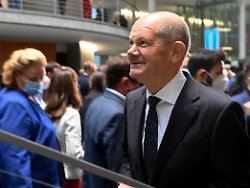Friday, October 1st, 2021
“Real Affection”
Olaf Scholz already sees himself in the Chancellery
Olaf Scholz is certain that the traffic light negotiations will lead to success. In a recent “Spiegel” interview, the SPD’s candidate for chancellor shows himself to be extremely self-confident. It promises progress and reveals what is important in the coalition negotiations.
Olaf Scholz: ninth German Chancellor, successor to Angela Merkel and first head of government of a three-party alliance in the history of the Federal Republic of Germany. This description will apply to Olaf Scholz in the future – at least he assumes it himself. The incumbent Vice Chancellor is very optimistic about the explorations with the Greens and the FDP. In an interview with “Spiegel” he gave a brief answer to the question of whether he would be Chancellor at the end of the upcoming traffic light negotiations: “Yes.”
The 63-year-old sees the result of the general election as a clear message. The voters made the SPD the strongest force and gave it a government mandate. In his opinion, this message also applies to the Greens and the FDP. “The citizens want progress,” said Scholz. “The three parties to the traffic light are united by the idea of progress in society.”
Departure instead of “business as usual”
In the election campaign, Scholz seemed more like a kind of Merkel 2.0, he staged himself with a Merkel diamond and did not want to speak badly about the Chancellor himself when asked. The impression was: Scholz relies on “business as usual” instead of a real departure. He himself sees it differently, that becomes clear in the interview. “Successful social democratic parties don’t believe that life used to be better,” Scholz assures “Spiegel”. The SPD’s ideas about progress have to do with respect and industrial modernization, including stopping man-made climate change. In his opinion, the Greens and the FDP fit well with this political approach: “In the Greens’ progress story, of course, climate change plays a prominent role. And the FDP is a lot about technological modernization and civil rights. I am optimistic that a traffic light coalition can succeed . “
This is also the only option for Scholz to implement his aspirations. In order for such an alliance to be possible, it is important to convince the FDP in particular. As party leader Christian Lindner often emphasizes, it is closer to the Union in terms of content and could not be averse to a Jamaica alliance. The fact that Scholz has to build bridges here is also reflected in his interview responses.
“It is not helpful to insult your partner as a ‘cucumber troop’, as was the case with black and yellow,” says Scholz, describing his approach to negotiations. A swipe at the Union? In 2010 a dispute broke out within the then black-yellow coalition. Alexander Dobrindt, CSU general secretary at the time, insulted the liberals as “cucumber troops”. What Scholz does not talk about: It was just a reaction. The CSU had previously been called “Wildsau” by the FDP.
With a view to the failed Jamaica negotiations in 2017, Scholz takes the side of the liberals. “It was wrong for the FDP to leave the negotiations, but of course it was right on one point with its criticism. The coalition negotiations gave the impression that it was all about the Union and the Greens.” Scholz makes it clear in the interview: The FDP does not have to fear such behavior in traffic light negotiations. “Political leadership consists in the fact that the parties talk to each other on an equal footing.” For the talks with the Greens and the FDP he already has a recipe for success from real life ready: “Real affection arises when you get seriously involved with each other.”
